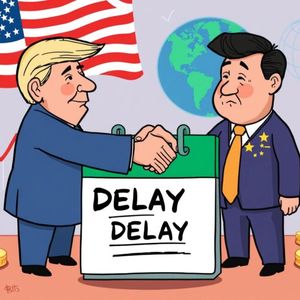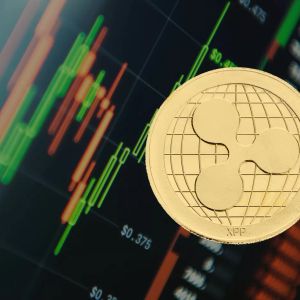BitcoinWorld US-China Trade Relations: Crucial Delay in Sanctions Offers Market Relief Geopolitical events often send ripples across the global financial landscape, and the cryptocurrency market is no exception. Understanding these macro shifts is vital for any investor. A notable decision from the Trump administration to delay the expansion of a China sanctions list provides a fascinating case study into the intricate dynamics of US-China trade relations and their broader economic impact. What Did the Sanctions Delay Mean for US-China Trade Relations? The Trump administration agreed to delay for one year the implementation of a rule. This rule would have significantly expanded the list of Chinese companies subject to Commerce Department sanctions, as reported by Walter Bloomberg. This decision, while temporary, was a significant moment. It signaled a pause in escalating trade tensions, offering a brief respite from the constant pressure points between the two economic superpowers. The immediate implication was a momentary easing of concerns over further economic decoupling. How Do Geopolitical Shifts Impact Global Markets and Crypto? When major economies like the US and China engage in trade disputes or impose sanctions, the effects are far-reaching. Traditional markets, such as stock exchanges and commodity markets, often react with volatility. Investor confidence can waver, leading to capital flight from perceived riskier assets. This is where the interconnectedness with cryptocurrency markets becomes clear. While crypto operates on decentralized networks, it does not exist in a vacuum. Global economic stability, or instability, directly influences investor sentiment and risk appetite for assets like Bitcoin and Ethereum. A positive development in US-China trade relations can therefore contribute to a more stable, or even bullish, outlook for crypto. Bridging the Gap: Sanctions, Stability, and Your Digital Assets The delay in sanctions provided a window of opportunity for markets to breathe. Reduced geopolitical friction typically translates into lower uncertainty for global supply chains and international commerce. This stability can encourage investors to allocate capital towards growth-oriented assets, including cryptocurrencies. Consider the alternative: had the sanctions expanded, it could have triggered a cascade of negative reactions: Increased Market Volatility: Stocks might have fallen, and traditional safe-haven assets could have surged. Supply Chain Disruptions: Businesses reliant on US-China trade would face increased costs and operational hurdles. Reduced Risk Appetite: Investors might pull funds from speculative assets, including crypto, opting for safer havens. The delay, conversely, helped to mitigate these potential risks, at least temporarily, offering a calmer environment for all financial markets, including digital assets. This highlights the delicate balance within US-China trade relations . Navigating Future US-China Trade Relations: What Comes Next? While the one-year delay offered immediate relief, it also underscored the ongoing complexities. Geopolitical landscapes are constantly shifting, and past decisions often set precedents for future actions. This particular delay was a temporary measure, meaning the underlying tensions and the potential for future sanctions remained. For investors, the key takeaway is the importance of staying informed. Monitoring developments in global politics and major economic policies is crucial. Such events can provide early indicators of potential market shifts, allowing for more informed decision-making regarding both traditional and digital asset portfolios. In conclusion, the Trump administration’s decision to delay the expansion of China sanctions was a significant event that temporarily eased tensions in US-China trade relations . This move had a ripple effect across global markets, creating a more stable environment that indirectly benefited the cryptocurrency space by reducing overall economic uncertainty. While the immediate impact was positive, it serves as a powerful reminder of how interconnected our world truly is, urging us all to remain vigilant to geopolitical shifts that can influence our financial futures. Frequently Asked Questions (FAQs) Q1: What was the specific sanction expansion delayed by the Trump administration? A1: The Trump administration delayed the implementation of a rule that would have expanded the list of Chinese companies subject to Commerce Department sanctions. Q2: How do US-China trade relations typically affect global financial markets? A2: Tensions or cooperation in US-China trade relations can significantly impact global markets. Tensions often lead to increased volatility and reduced investor confidence, while improved relations tend to foster stability and encourage investment. Q3: Is there a direct link between geopolitical events and cryptocurrency prices? A3: While not always direct, geopolitical events often influence broader market sentiment and economic stability. This, in turn, affects investor risk appetite, which can lead to indirect impacts on cryptocurrency prices as investors reallocate funds. Q4: What should investors consider when geopolitical tensions arise? A4: Investors should consider diversifying their portfolios, staying informed about global events, and understanding how different asset classes might react to increased uncertainty. Monitoring news related to US-China trade relations is particularly important. Q5: What does the term “sanctions list” mean in this context? A5: A sanctions list, in this context, refers to a compilation of entities (companies, individuals) that are subject to specific restrictions or prohibitions by a government, often for reasons related to national security, foreign policy, or human rights. If you found this analysis insightful, consider sharing it with your network! Understanding the intricate dance between global politics and financial markets is key to navigating today’s investment landscape. To learn more about the latest global market trends, explore our article on key developments shaping US-China trade relations and their impact on crypto markets . This post US-China Trade Relations: Crucial Delay in Sanctions Offers Market Relief first appeared on BitcoinWorld .
















